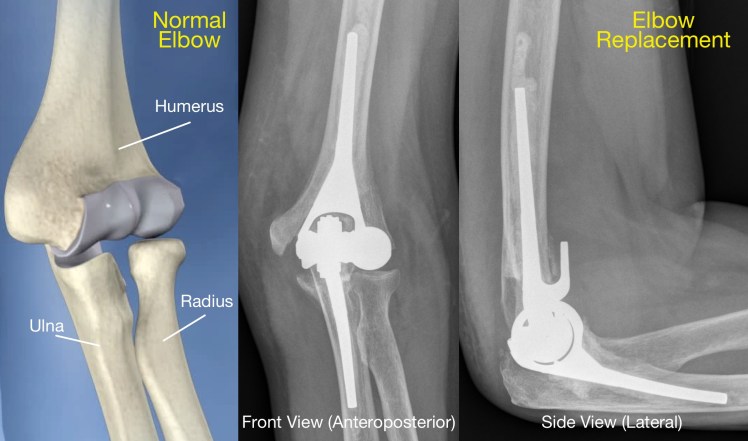Shoulder & Elbow Replacement
Shoulder And Elbow Replacement
The primary reason for doing a total elbow or shoulder replacement is pain with serious degenerative or rheumatoid arthritis. Another subset of candidates for the procedures includes patients with unreconstructable joint fractures. Total shoulder and total elbow replacement are more commonly done in older patients, because the condition of younger patients suffering from joint problems can often be improved without surgery.
The following are some of the degenerative and arthritic conditions that can be treated by shoulder and elbow replacement:
- Rheumatoid arthritis
- Post-traumatic arthritis
- Osteoarthritis
- Rotator cuff tear Arthropathy
- Severe fractures
- Failed shoulder or elbow replacement surgery

Shoulder and Elbow Treatment Options
The following are the minimally invasive arthroscopic shoulder and elbow surgery, which provides improved function, less pain and faster recovery:
- arthroscopic Ligament & Capsule Repair
- Elbow Ligament & Tendon Replacement
- Elbow Replacement Surgery
- Outpatient Physical Therapy
- Revision Shoulder Surgery
- Rotator Cuff Repair
- Total Shoulder Replacement Surgery
Total Shoulder replacement
Our shoulder is a ball and socket joint between the head of the humerus and the glenoid cavity of the scapula. It is the major joint connecting the upper limb to the trunk which enables you to raise, twist and bend your arm. It also lets you to move your arm forward to the side and behind you.
Total shoulder replacement is helpful, when there is a shoulder pain due to degenerative joint disease or arthritis, which cannot be controlled with non-operative treatment options. During the procedure the surgeon implants a metal rod places inside the upper arm bone with a smooth metal ball at the end and repolishes the corroded glenoid and caps with a metal or plastic component.
Total Elbow Replacement
Our elbow is a hinge joint which consists of upper arm bone, the outer forearm bone and the inner forearm bone. Total arm replacement is recommended when there is extensive deterioration of the cartilage of the elbow due to trauma or arthritis.
In elbow replacement surgery, an artificial implant (hinge) made of durable plastic and metal is inserted into the elbow joint which helps to ease the movement of forearm bones to contact the humerus. The surgeon may also adjust the ligaments that surround the elbow to achieve the best possible functions.
Pros and cons of shoulder and elbow replacement
Pros:
- Reduced joint pain
- Improved quality of life
- An improved range of motion in some cases
- Will be able to carry on with normal everyday activities
Cons:
- Range of movement will be less than with a natural healthy joint
- Infection or stiffness
- Loosening of the replacement parts
- Damage to nearby nerves causing temporary loss of function

